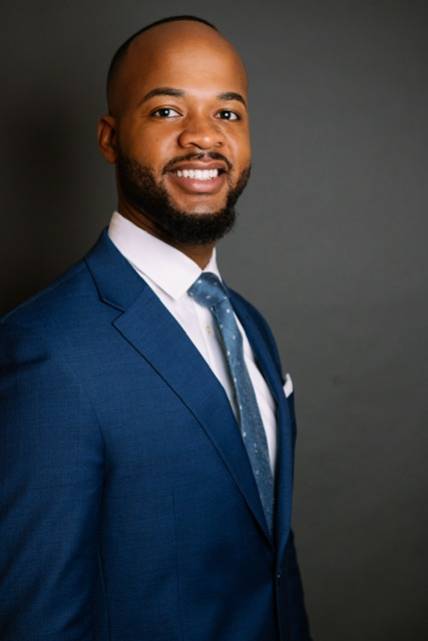Student Spotlight: Quamid Francis (MPA-PNP)

By: Claudia Babcock (MPA)
Name: Quamid Francis
Hometown: Born and raised in St. Thomas, US Virgin Islands, moved to Kissimmee, Florida—now current hometown.
NYU Wagner Degree Program and Specialization: MPA-PNP, International Policy and Management
1. Tell us about yourself!
I was born and raised in St. Thomas, US Virgin Islands, and moved to Kissimmee, Florida, where I completed high school. In 2008, I enlisted in the US Marine Corps where I served for eight years. As a marine, I was a financial auditor. While deployed in Afghanistan, I managed several finance intelligence payment programs in support of US special operations. Also, during my time in the Marines, I was granted the President’s Bronze Volunteer Service Award by President Obama, recognizing US citizens and permanent residents who have achieved the required number of hours of service over a 12-month time period or cumulative hours over the course of a lifetime.
After leaving the Marines in 2015, I moved to New York City where I completed my bachelor’s degree in public policy at Baruch College. Subsequently, I continued to NYU Wagner in the Fall of 2017. While in New York, I have been active in public policy and politics with internships and full-time positions at the New York City Council, the New York State Senate, and the New York City Department of Citywide Administrative Services (NYC DCAS).
2. What are you currently working on? Can you describe the project or work you would like to highlight?
I recently completed my capstone project, which was a challenging, yet rewarding experience, and will be one that I look back on as the hallmark of my time here at NYU Wagner.
As part of a four-member team, we embarked on a case study review of a public-private partnership (PPP) between a private waste management company and a municipal government in the Greater Accra Region of Ghana for the commercialization of Fortifer, a waste-based fertilizer. Through our fieldwork in Ghana and an in-depth literature review, our team was able to come up with recommendations on how to capture the potential of PPPs in resource, recovery, and reuse to improve urban sanitation that would address a number of interrelated problems such as food insecurity, soil degradation, collaborative partnerships between communities and organizations, and ultimately the scaling of prosocial partnerships.
3. What NYU Wagner experiences have helped you the most with this project or work?
I want to highlight two very different courses that I think helped me with my capstone. One is Institutions, Government, and International Development (IGID) taught by Professor Iskander, and the other is International Economic Development (IED), taught by Professor Mordoch. I think those two very different courses provided me with the necessary critical thinking skills and knowledge on how to approach development work. Whereas IED focused more on markets and policy interventions to eradicate poverty and inequalities, IGID concentrated more on the role and structures of organizations and authority as it relates to development. Put together, the lessons I gleaned from both courses informed how I approached the different questions I asked during interviews and how to think about the data that our team had collected, and what that meant for answering our research question.
4. What experiences at NYU Wagner helped you in your search for an internship or job?
What was valuable for me at NYU Wagner was being connected with other first-generation college students and the platform we were provided to share our stories. This is what led to my network expanding and, as a consequence, the opportunities that would follow. In particular, I was made aware of the Social Sector Leadership Diversity (SSLD) Fellowship, to which I applied and became a fellow. The SSLD fellowship introduces critical leadership theories, offers personalized support, and provides opportunities for fellows to practice the skills required to lead ethically, inclusively, and collaboratively in organizations across the social sector. This cohort led me to land an eight-month internship as a graduate policy officer at NYC DCAS.
5. Can you recall an experience while at NYU Wagner that struck you as particularly meaningful?
The most meaningful experience for me at NYU Wagner remains the time I spoke as a panelist on the panel for first-generation college students. That was the first time I had the opportunity to tell my story along with the struggles and barriers first-generation college students encounter. I think it was also the first time many of my fellow colleagues became aware of my story and that I was a first-gen student.
6. What is something about your identity that has impacted the way you approach public service?
Being a first-gen college student and veteran who was exposed to combat situations.
7. If you could start over at NYU Wagner, is there anything you would do differently?
Nothing I can think of at this time.
8. What is your favorite spot on campus or at the Puck Building where you feel inspired or simply enjoy working?
I typically do most of my studying or work off campus.
9. What’s your next move?
I am currently exploring opportunities in the consulting and impact investing fields to focus on issues around equitable urban development and small-business services. I am interested in education programs and services for low-income communities and initiatives around workforce development for marginalized communities. I also intend on engaging in politics again someday.